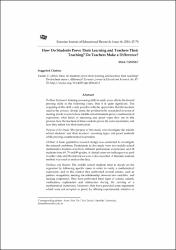How Do Students Prove Their Learning and Teachers Their Teaching? Do Teachers Make a Difference?
Abstract
Problem Statement: Gaining reasoning skills in early years affects the formal proving skills in the following years, thus it is quite significant. The acquiring of this skill is only possible with the approaches that the teachers used in the process. At this point, the problem to be researched in terms of making proofs is seen in how middle school students prove a mathematical expression; what kinds of reasoning and proof types they use in this process; how the teachers of these students prove the same expression; and how they reflect it to their instruction. Purpose of the Study: The purpose of this study is to investigate the middle school students' and their teachers' reasoning types and proof methods while proving a mathematical expression. Method: A basic qualitative research design was conducted to investigate the research problems. Participants in this study were two middle school mathematics teachers who have different professional experiences, and 18 students from 6th, 7th and 8th grades. A clinical interview technique was used to collect data and the interviews were video recorded. A thematic analysis method was used to analyze the data. Findings and Results: The middle school students tried to decide on the argument by following specific cases in order to verify a mathematical expression, and in this context they performed several actions, such as pattern recognition, seeking the relationship between two variables, and making conjectures. They have performed three types of actions, namely verification, explanation and abstraction during the proving of a mathematical expression. Moreover, they have provided some arguments which were not accepted as proof, by offering experimental, intuitive or illogical justification. On the other hand, it has been observed that the middle school mathematic teachers thought in the same way that their students thought while proving a given mathematical expression. Discussion, Conclusion and Recommendations: As a result of this study, it has been found that students had difficulties in proving mathematical statements; they preferred to use experimental proofs and mostly adapted an inductive approach. On the other hand, the proving tendency of the teachers was mostly at a verification and explanation level; they have a similar structure of thinking with their students in the process of proving mathematical expressions. Reasoning and proof should be the fundamental aspects of mathematics teaching, should play a significant role in mathematical contents without taking it independently, and should be developed in the earlier years. In addition, to what extent mathematics textbooks and mathematics curriculum in each grade level support the reasoning and proof standards should be investigated.


















